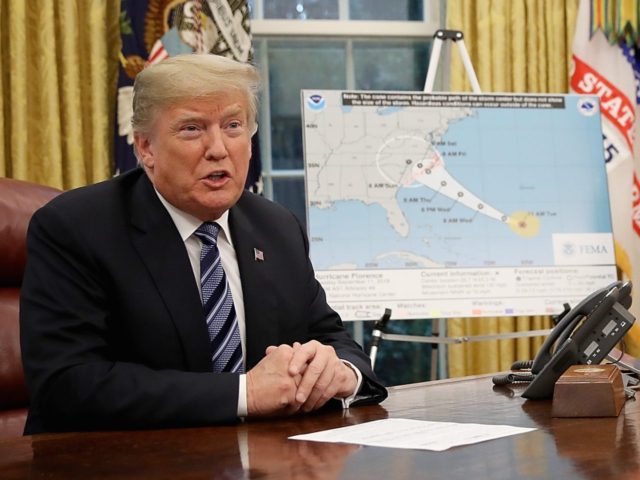Hurricane Florence may prove to be the ultimate test of the Trump Theorem: that the media care most about what he says, while the voters care most about what he does.
The media had a different rule for President Barack Obama, first described by Rush Limbaugh and known thereafter as the Limbaugh Theorem: that nothing bad that happened on Obama’s watch would ever be attributed to him.
Not the IRS scandal, not the Benghazi terror attack, not the slow economic recovery. Obama was a spectator to events.
As of last week, when Obama claimed credit for Trump’s economic recovery, there may be a new corollary to the Limbaugh Theorem: that everything good that happens on Trump’s watch will now be attributed to Obama’s outstanding leadership.
Trump, in contrast, will be blamed for everything bad that happens — even hurricanes. But that is Trump Derangement Syndrome, not the Trump Theorem, which is a more serious description of the way the media and the public differ about him.
As most of the country already knows by now, Trump tweeted Thursday morning that Democrats were inflating death tolls from Hurricane Maria in Puerto Rico the year before “in order to make me look as bad as possible.”
Trump also attempted to explain how the supposed death toll had risen from the dozens originally reported by Puerto Rico’s beleaguered government to the several thousands now estimated by studies: “If a person died for any reason, like old age, just add them onto the list.”
As this author explained, Trump was correct. Democrats and the media had been hyping higher estimates of the death toll so that Hurricane Maria could be turned into his version of Hurricane Katrina, which tarnished President George W. Bush and sank Republicans in the midterm election of 2006.
The new official number, 2,975, is a statistical estimate — and it is outside the range of most such estimates, second only to a Harvard study that used surveys to extrapolate to 4,645 dead. (One could perhaps give credit to Democrats and the media for lowering the Puerto Rico death toll, resurrecting 1,670 statistical people.)
But facts, as Dilbert cartoonist Scott Adams is fond of saying, do not matter.
Nor does it matter that Trump was responding to days of negative coverage in which the media had attacked him over Hurricane Maria to lay the predicate for reporting on the new hurricane.
(If Florence is seen as a “failure,” then it will be part of an alleged pattern of incompetence within the Trump administration. Alternatively, if Florence is a “success,” it will be because Trump is “racist” and does not care about Latinos.)
What matters is that on the eve of landfall of a major, life-threatening and frightening storm, Trump indulged in a political argument. His words were easily spun by his opponents to show their audience that he cared more about himself than he did about the victims of natural disasters — never mind that he had spent days tweeting and talking about Hurricane Florence.
He allowed himself to be goaded into a fight — just as he allowed George Stephanopoulos to goad him into attacking Khizr Khan’s silent wife in July 2016.
That mistake did not, ultimately, cost Trump the election. Nor will this mistake, if the president can demonstrate — at least to those beyond the Trump Derangement Syndrome bubble — that he can manage the storm.
He has already called his shot: “We are completely ready for hurricane Florence, as the storm gets even larger and more powerful.”
The media will look for — or invent — mistakes. But overall, if the response to Hurricane Florence is like the response to Hurricane Harvey — a success the media largely avoid talking about — then it will not matter what Trump said about Hurricane Maria, at least to his supporters. The media and the Democrats will declare Trump a racist for succeeding (see above), and otherwise ignore Hurricane Florence until after November.
The Trump Theorem will be in effect. Actions, not words.
Joel B. Pollak is Senior Editor-at-Large at Breitbart News. He is a winner of the 2018 Robert Novak Journalism Alumni Fellowship. He is also the co-author of How Trump Won: The Inside Story of a Revolution, which is available from Regnery. Follow him on Twitter at @joelpollak.

COMMENTS
Please let us know if you're having issues with commenting.